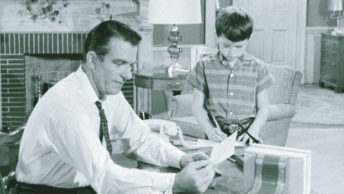Once there was a man—let’s call him Tim—who was dying of cancer; thanks to hospice care, he was able to stay in his own home, where he spent all his time in bed. Tim happened to be a huge soccer fan, and because that’s not a major American sport, he kept up with European soccer, and followed the championship games very closely. Since Tim tired very easily, he couldn’t stay up late enough to watch the games on live television, so his sons brought him videos of the games that he could watch when it was convenient. Tim’s pastor, Father McGowan, came to see him, and Tim admitted that while he was basically at peace with the idea of dying, one thing concerned him. As a young man, he had lived a very sinful life, and even though he later repented and humbly and honestly confessed all his serious sins in the Sacrament of Reconciliation, Tim still wondered: when he saw Jesus face to face, would the Lord be angry or disgusted at him?
Father McGowan, who knew of Tim’s practice of watching videotapes of the soccer games, said, “Tim, here’s what will happen when you die. You and the Lord Jesus will sit down together and watch a special video all about you called ‘This is Your Life.’ It’s a long and extremely thorough video, though it will seem to go by quickly; it will show every single moral choice you’ve ever made—not only the ones you remember, but also all the ones you’ve forgotten. You’ll look with relief at some of the scenes; others will cause you to cringe; still others will cause you to think, ‘Wow, I never realized how my choices affected other people, either for good or for ill.’ You and Jesus will be reviewing your life by watching this video together, and then you’ll notice it has a lot of blank spots, moments when there’s nothing on the screen. You’ll wonder what’s going on, and suddenly you’ll realize all these missing scenes are the times you did something morally wrong, but then sincerely repented and received Christ’s mercy. When the Lord forgives you, He develops amnesia—and if you were to ask Him what was in the deleted scenes, He wouldn’t be able to tell you.” Father McGowan’s explanation put Tim completely at ease, and he died very peacefully a few days later—shortly after watching his favorite European team win the soccer championship (McArdle, 150 Stories for Preachers and Teachers, #58). In a sense, we become spiritual champions when we entrust ourselves to the love and mercy of God—for when we place ourselves in His hands and humbly ask forgiveness, our sins are forever wiped away.
Simon the Pharisee is a good example of someone who just didn’t get it; he thought religion was all about following rules, appeasing divine justice, and earning God’s favor. St. Paul, who himself had once lived by that misguided mindset, tells us in the 2nd Reading that we are not justified or saved by our good works, but by our living faith in the crucified and risen Lord. Simon, however, wasn’t ready to hear such a message; he had forgotten the story of David’s repentance and God’s immediate forgiveness of his sin, described in the 1st Reading; the idea of mercy didn’t enter into Simon’s thinking. Even worse, this attitude made him judgmental; his self-righteousness caused him to look down on the sinful woman. Jesus therefore used this opportunity not only to forgive the woman, but to correct Simon—in effect, warning him that unless his attitude changed, his eventual experience of divine judgment would not be a pleasant one.
What about us? What will it be like when we review our lives with the Lord? That will be a moment of either intense relief or profound regret—and it will be too late for us to add to, change, or delete anything we see in the story of our lives. Therefore, it makes sense to do our “film editing” now, making sure the “video” of our lives plays out the way we want. I think this means three things in particular. First, we have to fill our video with as many good scenes as possible—in other words, we have to include all the good and loving deeds as we can, things that will please the Lord when we have our private screening with Him. This isn’t a matter of earning our salvation—which, as St. Paul says, is impossible for us to do—but of letting our good deeds demonstrate our grateful acceptance of Christ’s gift of salvation. Even as we fully trust in the Lord’s mercy, we want to be sure we don’t appear before Him with empty hands. Secondly, we have to do everything possible to avoid the mistakes of Simon the Pharisee. We must not understand our relationship with God in a legalistic way, we must not become self- satisfied or self-righteous, and we must not judge or condemn others. Any and all of these attitudes will lead us seriously astray, making it hard—if not impossible—for us to humbly and honestly acknowledge our sins and ask for God’s forgiveness. Jesus warned that little is forgiven to the one who loves little; the hero of today’s Gospel wasn’t the person with the fewer sins, but the one with the greater love. Thirdly, as we edit the film of our lives, we need to delete as many bad scenes as possible—simply by admitting our sins and moral failings, and humbly yet confidently asking God to forgive them. The Lord hates sin, and intensely dislikes having to see or witness it—which is wonderful news, because it means He is profoundly grateful to us when we give Him the chance to erase that terrible image of our sins from His sight eternally by our sincere acts of repentance. Jesus only enjoys videos with a happy ending—and it’s up to us, every day of our lives, to make sure that’s what He’ll see when it’s our time to be judged by Him.
Fathers are a good example of what I’m talking about. When they’re on their deathbeds, preparing to meet the Lord, they won’t be thinking “I regret not making more money,” or “I’m sorry I didn’t work longer hours on the job.” No, what will matter at that moment is whether they tried to do a good job raising their sons and daughters—and the scenes in their life videos in which they’re playing with their children, teaching them, consoling them, helping them, and lovingly disciplining them, will be the ones which bring tears of joy and appreciation to the eyes of Jesus. Those of us who’ve had good and loving fathers are grateful to them and for them—and we’re called to live in a way that makes all their efforts and sacrifices worthwhile. Above all, each of us must believe, trust in, and share the mercy of our Heavenly Father—for only in this way can we be cleansed of our sins and become capable of rejoicing in His presence forever and ever.








